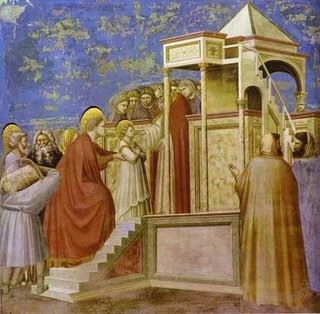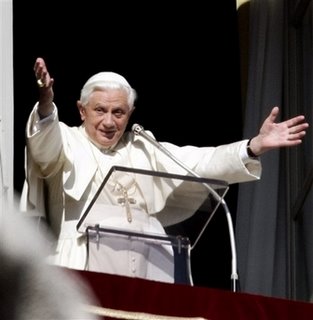 Greater Double (1955 Calendar): November 21
Greater Double (1955 Calendar): November 21Memorial (1969 Calendar): November 21
Today is the celebration of Mary's presentation in Jerusalem, which has been celebrated since the sixth century in some places. At the age of three, shortly after she could walk, the Blessed Virgin ascended the 15 steps up to the Temple to consecrate Herself to God. It is reasonable to assume that Our Lady entered the Temple at that young age with the words of Psalm 83 in her heart: "How lovely are Thy tabernacles, O Lord of hosts; my soul longeth and fainteth for the courts of the Lord" (Ps 83:1,2).
One reads about Mary's presentation in the temple only in apocryphal literature. The Protoevangelium of James states that Mary was offered by Anna and Joachim to God in the Temple when she was three years old. This action was to carry out Anna's promise to God that she had made when she was childless.
Today's feast emphasizes the holiness conferred on Mary from the beginning of her life on earth through her final Assumption into Heaven. Unlike the Assumption and Immaculate Conception Feast, today is not a Holy Day of Obligation.
This is also the on which the Church celebrates the World Day of Cloistered Life, established by Pope Pius XII in 1953.
Dom Guerangers writes the following history of today's Feast in his Liturgical Year:
The East had been celebrating for seven centuries at least the entrance of the Mother of God into the temple of Jerusalem when in 1372 Gregory XI permitted it to be kept for the first time by the Roman court at Avignon. Mary in return broke the chains of captivity, that had bound the Papacy for seventy years; and soon the successor of St. Peter returned to Rome. The feast of the Visitation, as we saw on July 2nd, was in like manner inserted in the Western Calendar, to commemorate the re-establishment of unity after the schism which followed the exile.
In 1373, following the example of the Sovereign Pontiff, Charles V of France introduced the feast of the Presentation into the chapel of his palace. By letters dated 10th November 1374, to the masters and students of the college of Navarre, he expressed his desire that it should be celebrated throughout the kingdom: “Charles, by the grace of God king of the Franks, to our dearly beloved: health in him who ceases not to honor his Mother on earth. Among other objects of our solicitude, of our daily care and diligent meditation, that which rightly occupies our first thoughts is, that the blessed Virgin and most holy Empress be honored by us with very great love, and praised as becomes the veneration due to her. For it is our duty to glorify her; and we, who raise the eyes of our soul to her on high, know what an incomparable protectress she is to all, how powerful a mediatrix with her blessed Son, for those who honor her with a pure heart... Wherefore, wishing to excite our faithful people to solemnize the said feast, as we ourselves propose to do by God's assistance every year of our life, we send this Office to your devotion, in order to increase your joy.”
Such was the language of princes in those days. Now just at that very time, the wise and pious king, following up the work begun at Brétigny by our Lady of Chartres, rescued France from its fallen and dismembered condition. In the State then, as well as in the Church, at this moment so critical for both, our Lady in her Presentation commanded the storm, and the smile of the infant Mary dispersed the clouds.
The new feast, enriched with Indulgences by Paul II, had gradually become general, when St. Pius V, wishing to diminish the number of Offices on the universal Calendar, included this one among his suppressions. But Sixtus V restored it to the Roman Breviary in 1585, and shortly afterward Clement VIII raised it to the rank of Double Major. Soon the Clergy and Regulars adopted the custom of renewing their holy vows on this day, whereon their Queen had opened before them the way that leads by sacrifice to the special love of our Lord.
"Hail, holy throne of God, divine sanctuary, house of glory, jewel most fair, chosen treasure house, and mercy seat for the whole world, heaven showing forth the glory of God. Purest Virgin, worthy of all praise, sanctuary dedicated to God and raised above all human condition, virgin soil, unplowed field, flourishing vine, fountain pouring out waters, virgin bearing a child, mother without knowing man, hidden treasure of innocence, ornament of sanctity, by your most acceptable prayers, strong with the authority of motherhood, to our Lord and God, Creator of all, your Son who was born of you without a father, steer the ship of the Church and bring it to a quiet harbor"
(Adapted from a homily by St. Germanus on the Presentation of the Mother of God)
Collect:
O God, Who didst will that this day the ever blessed Virgin Mary, dwelling-place of the Holy Ghost, should be presented in the temple: grant, we beseech Thee, that through her intercession, we may be worthy to be presented in the temple of Thy glory. Through our Lord.
Prayer Source: 1962 Roman Catholic Daily Missal










